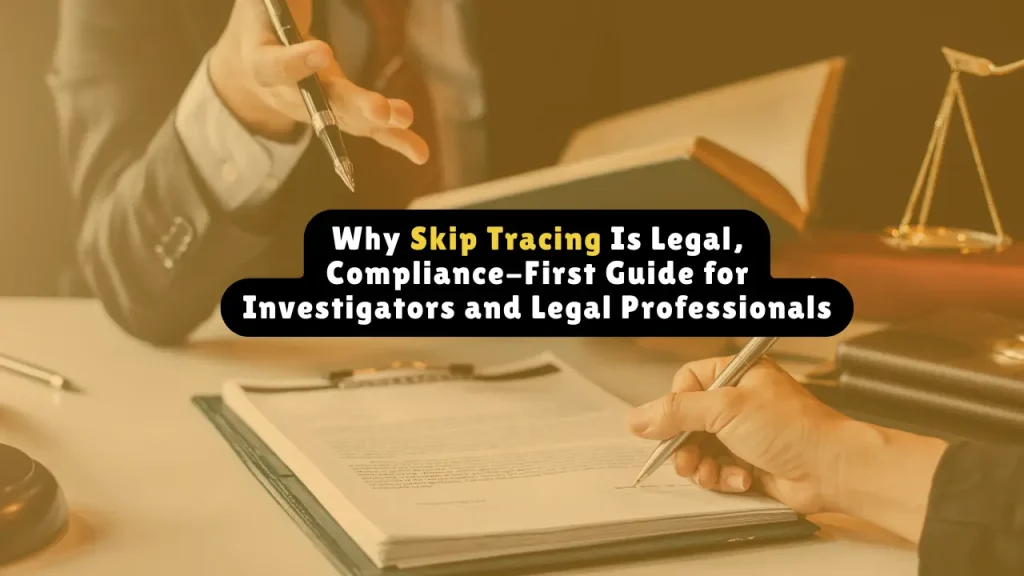Why Skip Tracing Is Legal, Compliance-First Guide for Investigators and Legal Professionals
Skip tracing—the strategic practice of locating individuals who have intentionally gone off-grid—remains legal and widely practiced due to its compliance with federal, state, and international privacy laws. When executed ethically and lawfully, it serves essential roles in due process, debt collection, asset recovery, and public safety.
Legal Purpose and Justification
Skip tracing is lawful when conducted for legitimate objectives, including:
- Serving court documents (e.g., subpoenas, summonses)
- Locating debtors for collections and judgment enforcement
- Identifying parties in litigation
- Tracing heirs or beneficiaries in probate
- Supporting fraud investigations and asset recovery
Courts and lawmakers recognize skip tracing as essential to:
- Due process: Ensuring defendants are properly notified
- Financial system integrity: Enabling $15B+ in debt recovery annually
- Public interest: Locating fugitives and missing persons
- Estate resolution: Assisting in the distribution of $3B+ in unclaimed inheritances
Table of Contents
Core Legal Framework
Skip tracing must comply with various laws, including:
| Regulation | Purpose |
| FCRA (Fair Credit Reporting Act) | Limits use of consumer credit data |
| FDCPA (Fair Debt Collection Practices Act) | Prohibits harassment and deception |
| GLBA (Gramm-Leach-Bliley Act) | Restricts access to financial data |
| DPPA (Driver’s Privacy Protection Act) | Limits DMV record use |
| TCPA (Telephone Consumer Protection Act) | Governs phone contact and robocalls |
| CCPA & State Laws | Grant opt-out and transparency rights |
| GDPR, PIPEDA, etc. | Regulate international data transfers and usage |
Skip tracing relies on publicly available and legally permissible data—not sensitive or private materials accessed without consent or court order.
Legal vs. Illegal Methods
| Legal Methods | Illegal Tactics | Governing Rule |
| Public court/property records | Hacking private accounts | Computer Fraud and Abuse Act |
| Credit headers (with purpose) | Accessing full credit report | FCRA §604 |
| Social media (public profiles) | Impersonation/pretexting | FTC Act §5 |
| Contacting known associates | Harassment/threats | FDCPA §806 |
| Licensed database use | Unauthorized police file access | State & federal statutes |
Licensing & Professional Ethics
- Some states require PI licensure to perform skip tracing.
- Licensing ensures adherence to lawful methods and opens practitioners to civil, criminal, and administrative penalties for violations.
- Professional bodies (e.g., NAPPS, CLLA) mandate ethics certification.
Violations may result in:
- $1,000+ FDCPA fines per incident
- Lawsuit liability (e.g., Duncan v. JMM Solutions, 2024)
- Loss of investigative licenses
Guardrails to Prevent Abuse
Skip tracing must adhere to best-practice guardrails:
- Legitimate purpose only—no speculative data fishing
- Data minimization—only use essential information (name, DOB, address)
- Cross-verification—confirm leads through at least two sources
- No deception—impersonation or coercion is illegal
Example: A social media check-in + utility bill in same ZIP code validates a suspected address.
Internal Compliance Practices
Legal professionals and investigators should implement:
- Internal audits of staff and vendor tracing methods
- Privacy policies aligned with FCRA/GDPR/CCPA
- Vendor agreements with compliance, indemnity, and data handling clauses
- Training on legal boundaries and documentation best practices
Related article: What is Skip Tracing? How It Works Compliance & Best Practices

Global & Cross-Border Considerations
- GDPR (EU): Requires purpose, minimization, and data protection
- PIPEDA (Canada), Australian Privacy Act: Similar restrictions apply
- Cross-border transfers must use SCCs or equivalent frameworks
Best Practice: Use compliant tools like IRBsearch, CLEAR, or Tracers that embed geofencing and audit trails.
Tech Tools That Enforce Legal Boundaries
Modern platforms offer built-in compliance:
- Audit logs: Track every search
- Redaction features: Hide restricted data fields
- Geo alerts: Warn when accessing data from restricted zones (e.g., EU subjects)
- Facial recognition & AI: Restricted unless licensed and with consent (per BIPA)
Risk of Non-Compliance
| Risk | Impact |
| FDCPA/FCRA Violations | Lawsuits, fines up to $1,000 per breach |
| Privacy infractions | Regulatory penalties, client lawsuits |
| Unlicensed tracing | Criminal prosecution, case dismissal |
| Reputational harm | Loss of business, court credibility |
Transparency, Consent & Data Rights
Under GDPR/CCPA:
- Subjects may request data reports or corrections
- Right to deletion and objection may apply
- Firms must disclose data sources and use upon request
Due Process Note: Courts often require evidence that skip tracing was reasonably and lawfully attempted before allowing alternative service.
Best-Practice Compliance Checklist
- ☑ Confirm lawful purpose (e.g., service of process, judgment collection)
- ☑ Use only authorized databases (e.g., TLOxp, CLEAR)
- ☑ Retain documentation and audit trails
- ☑ Limit data access to essential fields
- ☑ Train staff on legal methods and vendor vetting
- ☑ Avoid deceptive or coercive contact practices
- ☑ Ensure PI licensure where jurisdiction requires
Conclusion: Legal by Design
Skip tracing is lawful not because it evades privacy laws—but because it operates within them. By respecting legal boundaries, documenting purpose, and choosing ethical methods, legal professionals and investigators can perform skip tracing without risking liability.
As privacy laws evolve, so too must the tools and policies supporting skip tracing. With proper safeguards, this investigative practice will continue to serve the needs of courts, clients, creditors, and communities alike.
Contact AllAboutLawyer.com’s compliance team for templates, vendor assessments, or custom training modules tailored to your jurisdiction and practice area.
About the Author

Sarah Klein, JD, is a former consumer rights attorney who spent years helping clients with issues like unfair billing, product disputes, and debt collection practices. At All About Lawyer, she simplifies consumer protection laws so readers can defend their rights and resolve problems with confidence.
Read more about Sarah
